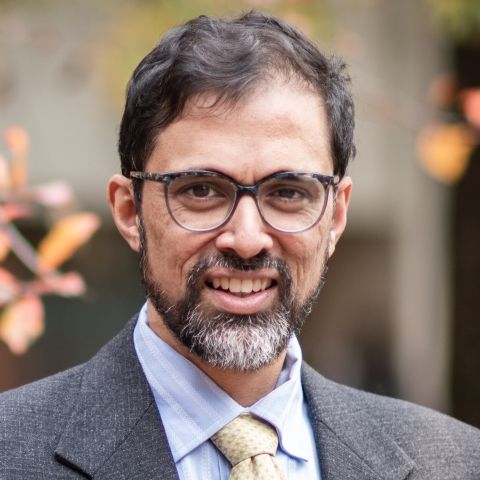Description:
The Strauss Center at the University of Texas at Austin and Ohio Northern University’s Pettit College of Law (ONU), in consultation with the AALS Section on National Security Law, established the Mike Lewis Prize for National Security Law Scholarship to honor Professor Mike Lewis of ONU, a much-loved colleague and prolific scholar who passed away in 2015. This podcast will feature an author interview with Professor Saikrishna B. Prakash, the 2023 Mike Lewis Prize recipient for his article, Deciphering the Commander-in-Chief Clause, which was published in the Yale Law Journal.
Saikrishna Prakash’s scholarship focuses on separation of powers, particularly executive powers. He teaches Constitutional Law, Foreign Relations Law and Presidential Powers at the University of Virginia School of Law. Professor Prakash’s most recent book, “The Living Presidency: An Originalist Argument Against Its Ever-Expanding Powers,” was published by Harvard Belknap Press in 2020. He also authored “Imperial from the Beginning: The Constitution of the Original Executive” (Yale University Press, 2015). The former book focuses on the modern presidency while the latter considers the presidency of the Founders. Prakash has authored over 75 law review articles. Among them are “Of Synchronicity and Supreme Law” in the Harvard Law Review, “The Indefensible Duty to Defend” in the Columbia Law Review, and “50 States, 50 Attorneys General and 50 Approaches to the Duty to Defend” and “The Executive Power Over Foreign Affairs” in the Yale Law Journal. Prakash has published op-eds in The New York Times, The Wall Street Journal and the Los Angeles Times. At the request of Democrats and Republicans, he has testified before Congress on matters of presidential removal, the Mueller Report and how Congress might better check the presidency. He is currently a Miller Center Senior Fellow. Prakash majored in economics and political science at Stanford University. At Yale Law School, he served as senior editor of the Yale Law Journal and received the John M. Olin Fellowship in Law, Economics and Public Policy. He subsequently clerked for Judge Laurence H. Silberman of the U.S. Court of Appeals for the District of Columbia Circuit and for Justice Clarence Thomas of the U.S. Supreme Court.
This program will coincide with the opening of the 2024 nomination process for the Mike Lewis Prize for National Security Law Scholarship. For more information about the prize and the nomination process, visit: https://www.strausscenter.org/mike-lewis-prize-for-national-security-law-scholarship/#:~:text=2022%20Mike%20Lewis%20Prize%20Winner,Law%20Review%2081%20(2022)
 Saikrishna Prakash, James Monroe Distinguished Professor of Law, University of Virginia School of Law
Saikrishna Prakash, James Monroe Distinguished Professor of Law, University of Virginia School of LawSaikrishna Prakash’s scholarship focuses on separation of powers, particularly executive powers. He teaches Constitutional Law, Foreign Relations Law and Presidential Powers at the Law School.
Prakash’s most recent book, “The Living Presidency: An Originalist Argument Against Its Ever-Expanding Powers,” was published by Harvard Belknap Press in 2020. He also authored “Imperial from the Beginning: The Constitution of the Original Executive” (Yale University Press, 2015). The former book focuses on the modern presidency while the latter considers the presidency of the Founders.
Prakash has authored over 75 law review articles. Among them are “Of Synchronicity and Supreme Law” in the Harvard Law Review, “The Indefensible Duty to Defend” in the Columbia Law Review and “Deciphering the Commander-in-Chief Clause” in the Yale Law Journal.
Prakash has published op-eds in The Wall Street Journal, The New York Times and the Los Angeles Times. At the request of Democrats and Republicans, he has testified before Congress on matters of presidential removal, the Mueller Report, how Congress might better check the presidency and the nomination of Judge Amy Coney Barrett to the Supreme Court. In 2015, he received the Roger Traynor award for faculty scholarship. In the same year, he received an honorable mention from the American Society of Legal Writers for his book “Imperial from the Beginning.” He has given named lectures at Princeton University, the Toledo Law School, William & Mary Law School and Yale Law School.
Prakash majored in economics and political science at Stanford University. At Yale Law School, he served as senior editor of the Yale Law Journal. He subsequently clerked for Judge Laurence H. Silberman of the U.S. Court of Appeals for the District of Columbia Circuit and for Justice Clarence Thomas of the U.S. Supreme Court. After practicing in New York for two years, he served as a visiting professor at the University of Illinois College of Law and as an associate professor at Boston University School of Law. He then spent several years at the University of San Diego School of Law as the Herzog Research Professor of Law. Prakash has served as a James Madison Fellow at Princeton University and visiting research fellow at the Hoover Institution at Stanford University. He has been a visiting professor at the Yale, Harvard, Northwestern and Chicago law schools.
 Amy Gaudion, Associate Professor of Law, Penn State Dickinson Law
Amy Gaudion, Associate Professor of Law, Penn State Dickinson LawAmy C. Gaudion leads Dickinson Law’s national security program. Professor Gaudion established and leads an annual cyberspace working group simulation in collaboration with the U.S. Army War College. She is the author of Defending Your Country . . . and Gender – Legal Challenges and Opportunities Confronting Women in the Military, in Women, Law and Culture: Conformity, Contradiction and Conflict (Jocelynne A. Scutt ed., 2016) (Palgrave Macmillan). In addition to scholarly journals, her work has appeared in The New York Times and The Daily Beast.
Professor Gaudion has served on and moderated numerous panels examining the impact of technology on the legal frameworks governing national security and intelligence, including Cybersecurity and Data Privacy: Equifax, the VEP, and CISA; iPhone vs. the FBI: Government Surveillance in the Post-Snowden Era; The Constitutionality and Consequences of America’s Use of Drones and the NSA Spying Program; and After Bin Laden: Stuxnet, Drones and the New Middle East. She has appeared on WITF’s Smart Talk and WHYY’s Radio Times.